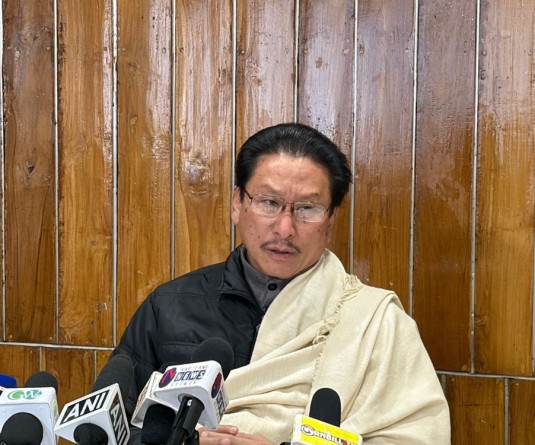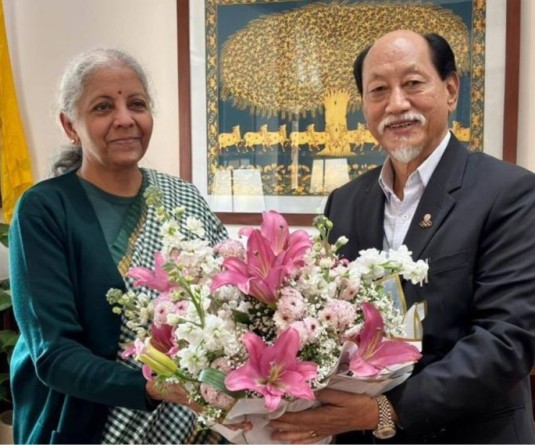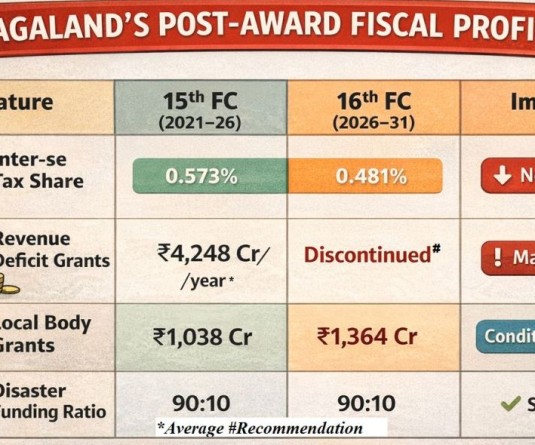MLA & Advisor Mmhonlümo Kikon and Emisenla Jamir during the launch of “This is how we disappear” held in Kohima on October 25. (Morung Photo)
‘This is how we disappear’ by Emisenla Jamir launched
Morung Express News
Kohima | October 25
Emphasizing that reading is the most powerful revolutionary act that can change our society, Mmhonlümo Kikon, MLA & Advisor, NRE, IT&C, Science & Technology on Tuesday afternoon said that this would further enable our young people to open their minds towards thinking positively.
Addressing the launch of “This is how we disappear” written by educator & poet, Emisenla Jamir at Kohima College, Kohima, he stated the need for more poets, writers and also readers in the state of Nagaland to enable change in the society. “We should promote literature and reading culture,” he categorically stated while also elucidating that, “when you read, it transforms your thinking and your perception on life.”
He went on to say that the emergence of publishing houses in Nagaland is also a revolutionary act and encouraged them to not only publish good books of poetry or fiction but also scale up marketing, which, he added, “should be one of the major arms in publishing.”
Towards this end, he said, “all of us who write should also assume their responsibility of promoting and taking their books in all the towns of Nagaland.” He urged for the need to support our writers while expressing his desire for the writing community to grow bigger. Stating that young people have aspirations but not based on meritocracy, he noted that, that is where the danger lies. However, reiterating that change can happen through reading, he said, Emisenla Jamir’s book is a contribution towards changing the society.
He further commented that “This is how we disappear” is well crafted and seamlessly written and also added that the author represents the new kind of generation from Nagaland.
‘Should place women writers in the right context’
Literary Critic & former HoD (English), Kohima College, Kohima, Dr Kevileno Sakhrie remarked that we should place women writers in the right context to show that they are also a part of the continuum that go back to their foremothers who were not allowed the right to literacy or to voice their inner thoughts.
Recognising that women’s way of experiencing is different from men’s, she further observed that in Nagaland, “although men have led the way in writing, when it comes to literary traditions and creative writing, women have far surpassed the men.”
‘Writing Poetry is a Revolutionary Act’
Putting across that what distinguishes the women writer is the added dimension of power, she stated that “power is involved in the act of writing.” “When a woman writes, her interior world will find expressions. Writing poetry is a revolutionary act,” she said.
“This is how we disappear,” she said is a very brilliant collection of poems, leading readers through very complex issues of loss, grief, identity, marriage proposals (or lack thereof), creativity and art, the mother figure, and the oldest human fears—death, decay and disappearance.”
Describing Emisenla Jamir as a poet of great depth, she said, “you just can’t glance through her poems, you have to read again and again.” The book, she further said, “leaves behind a whole world of meaning and evidence.” Her poetry, she said, “stands out from much of the poetry being published today. In the book, she demonstrates that poetry itself is the essence of language.”
In the foreword of the book, Dr Kevileno Sakhrie had also written that “intelligently steeped in her political, societal and cultural contexts, the poet deftly moves from narrative to lyrical, from ethical negotiation to fierce resistance, from exploration of gender and power and family intimacies to small yet poignant and often startling diamond-point moments of lucidity, all set to the unique music of her own style and language.”
In her author’s note & reading, Emisenla Jamir expressed that she has been writing poetry for some time now, and over the years, collected enough to make her consider a second publication. Stating that her foray into the world of publishing started with PenThrill in 2014 through “Raconteurs from the hills,” she said that “it only felt right that I should come back to PenThrill to find a home for my poems.”
Through the publishing process, she expressed, “I am truly fortunate to have that support system from my fellow writers, family, friends and colleagues, who have gently nudged me forward whenever I would begin to doubt myself.”
Ultimately, she added, “for me, if a line from this collection moves you, or makes you see the world in a different light, if it brings you some semblance of comfort, or if it disturbs you and makes you uncomfortable, then I think it will have been worth it.”
Highlights of the event included prayer by Limajungla Jamir, Assistant Professor, English Department, KCK and publisher’s note by Vishü Rita Krocha while Dr Avinuo Kire, Assistant Professor, English Department, KCK chaired the programme.






